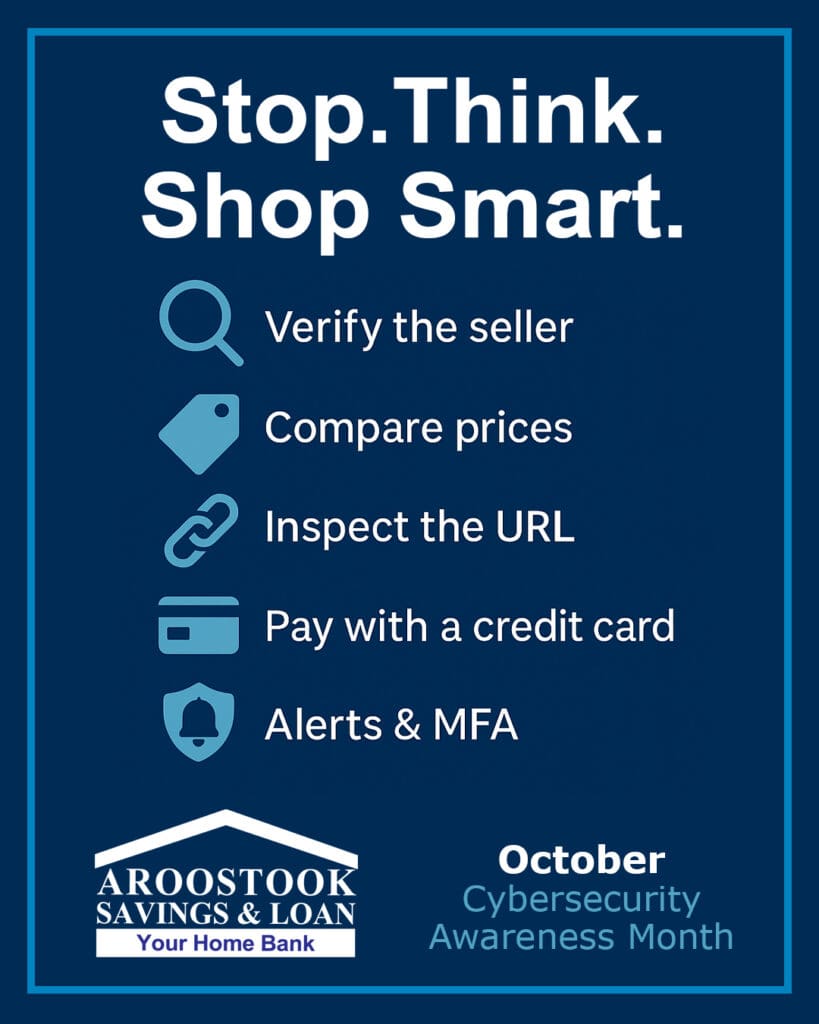Fraud & Security Blog

Fraud & Security Blog
How We Keep Your Accounts Safe
At Aroostook Savings & Loan, protecting your financial well-being is more than a responsibility—it’s part of our commitment to you. As Your Home Bank, we use advanced fraud detection tools and layered security controls to help protect your information against evolving threats like phishing, fake checks, ACH fraud, malware, and ransomware.
But prevention also starts with knowledge. That’s why we’re committed to providing clear, easy-to-understand resources to help you recognize fraud before it happens. From Social Security scams to phishing emails and student loan fraud, our Fraud & Security Blog is here to keep you informed—and one step ahead. If you have questions or need assistance, contact us anytime. We’re here to help you stay secure.
Scam Smart with Your Home Bank
Stay Alert. Stay Protected.
Fraud Trends & Tips to Secure Your Finances:
___________
2025 October Cybersecurity Awareness Month
Beware of Social Media and Online “Deals”
See a jaw-dropping price on a well-known brand in your feed? Pause. Scammers impersonate real companies, spinning up ads and look-alike websites to steal money and personal information. You might pay and get a cheap knockoff—or nothing. Worse, entering your address, card or bank numbers, or Social Security number can open the door to identity theft and financial loss. To protect yourself, remember to Stop. Think. Shop Smart.

- Verify the seller. The logo in an ad doesn’t prove it’s the brand. Visit the profile and website, then search the seller’s name plus “scam,” “complaint,” or “review.”
- Compare prices. If it’s far below other retailers, assume it’s a scam and move on.
- Inspect the URL. Misspellings, extra hyphens, or odd domains (e.g., .shop, .top) are red flags.
- Pay with a credit card. You’ll have strong dispute protections if something goes wrong—like if the item never arrives or isn’t as advertised. Never pay with gift cards, wire transfers, crypto, or P2P apps at a stranger’s request.
- Limit what you share. Skip unnecessary accounts; don’t upload ID images for a routine purchase.
- Use alerts & controls. Turn on transaction alerts in your mobile app and enable multifactor authentication (MFA) wherever offered.
Staying vigilant protects you—and your wallet—from phishing and scam threats. Need help? Report at ReportFraud.ftc.gov and get a personalized recovery plan at IdentityTheft.gov
___________
May 2025
Student Loan Scams Are On The Rise – Stay Alert!
Did you recently get an email about your federal student loans? Not sure about the status of your federal student loans? Start by logging in to StudentAid.gov. You’ll see information about your loan servicer and how to reach them. If you have questions or need help with your loans, contact your servicer directly.
You don’t have to pay for help managing your student loans. Get free help at StudentAid.gov. If your loans are private, go straight to your loan servicer for help.
Know this: Scammers might try to reach out to steal your money and information. Here’s how to avoid student loan scams:
- Don’t rely on government seals or logos to decide what might be “real.”
- Don’t buy promises of special access.
- Never pay an upfront fee.
- Never share your FSA ID.
Manage your loans for free at StudentAid.gov. Think you’ve spotted a student loan scammer? Report them at ReportFraud.ftc.gov.
Source: www.consumer.ftc.gov
___________
April 2025
Protecting Your Social Security Benefits
Beginning this April, the Social Security Administration (SSA) is taking a major step to protect beneficiaries from direct deposit fraud—especially scams involving phone calls requesting bank information changes.
Effective March 31, 2025 the SSA will no longer accept direct deposit changes over the phone. This decision follows reports showing that nearly 40% of direct deposit fraud was linked to phone scams. To better protect your benefits, updates must now be made through two-factor authentication on the “my Social Security” portal at ssa.gov/myaccount or in person by visiting your local SSA office in person.
This change applies to both new applicants and existing recipients who want to change their direct deposit and banking details. While this added step may require extra effort, it significantly reduces the risk of identity theft and aligns with security protocols used by leading financial institutions.
Please share this important update with friends and family—especially seniors who may be more vulnerable to scams. Staying informed is the first step in staying protected.
Important note: If you are not currently applying for benefits or requesting changes to existing direct deposit information, no action is required. You will continue to receive your payments as scheduled, and there is no need to verify your identity unless prompted during an update request.
Source: www.ssa.gov
___________
January 2025
Top 5 Scams of 2024
Fraud continues to rise, with one in 10 adults in the U.S. falling victim to scams every year. According to the Federal Trade Commission (FTC), fraud cases increased by 25% in 2023.
Here are the top five scams to watch out for:
- Online Purchase Scams Websites like Craigslist, eBay, and other online purchase websites that directly connect sellers and buyers. Scammers
list items, collect payment from buyers, and then never ship the goods. Conversely, scammers will sometimes pay for items with a bogus check in order to ask for a refund for “accidentally” overpaying. - Fake Tech Support Scams Ironically, tech support scams typically take the form of an advertisement, email, or pop-up that warns users their computer may be infected with a bug or virus. Once users engage, scammers then pretend to be an IT professional and badger victims to hand over money in exchange for phony tech support.
- Employment Scams Fraudsters pose as potential employers and fool victims into thinking they’re being offered a job or considered for a position. From there, they trick victims into sending money to be spent on “training” or “equipment,” or carry out a fake check scam using a bogus paycheck.
- Fake Checks and Money Orders This convoluted scheme relies on scammers sending victims a fake check, getting them to deposit it, and then asking for some of the “money” back via wire transfer due to a supposed overpayment — hoping that banks don’t notice the check is fake until it’s too late.
- Imposter Scams Scammers often pretended to be calling from the Social Security, IRS or a well-known business, a romantic interest, or a family member with an emergency. When people lost money, they most frequently reported paying scammers with a gift card or by wiring them money.
If you encounter a scam, report it to ftc.gov/complaint. Share this information with friends and family to help protect your community. For more tips, visit ftc.gov/imposters and ftc.gov/giftcards
Source: www.consumer.ftc.gov
___________
2024 October Cybersecurity Awareness Month
Protect Yourself from Phishing Attacks
One of the biggest personal finance threats—phishing attacks. These scams use fake emails, texts, or websites to trick you into revealing sensitive information like account numbers or passwords. Falling for phishing can lead to identity theft and serious financial loss. To protect yourself, here’s what to watch out for:
Mysterious Messages Phishing emails may appear to come from someone you trust, like your bank or a service provider. But often, the sender’s email doesn’t match the real source. Always verify the sender before acting.
Urgent Demands Many phishing emails are designed to create a sense of urgency. They may claim there’s been suspicious activity on your account or that you need to verify your information immediately. This pressure is meant to get you to react without thinking. Take a moment to pause and ask yourself: does this request make sense?
Sneaky Links Phishing messages often ask you to click a link or download an attachment, but these can be dangerous. Clicking on them may give criminals access to your private information. Never click on unexpected links or attachments. Instead, go directly to the official website by typing the address into your browser.
Stop, Look, Think Before acting on any suspicious message, take a moment to assess if it seems out of place or strange. If it looks like a phishing attempt, don’t interact. Delete the message immediately!
By staying vigilant and following these tips, you can help protect yourself and your personal finances from phishing threats. For more tips on spotting phishing attacks, visit www.BanksNeverAskThat.com and take the quiz to see how savvy you are!
